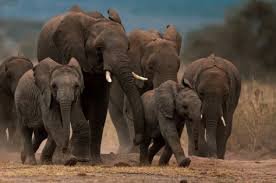
In a controversial decision, authorities in Zimbabwe have approved the culling of 200 elephants to provide food for citizens grappling with severe hunger caused by the country’s worst drought in decades. Tinashe Farawo, spokesperson for the Zimbabwe Parks and Wildlife Authority, stated that nearly half of Zimbabwe’s population faces the risk of acute hunger, prompting the targeted cull.
This decision follows a similar move by Namibia, which authorized the culling of elephants and other wildlife to combat food insecurity exacerbated by prolonged drought conditions. Both countries are experiencing severe environmental challenges linked to climate change and the El Niño phenomenon.
According to Farawo, Zimbabwe’s elephant population currently exceeds 84,000—almost double the sustainable capacity of 45,000. The nation hosts the second-largest elephant population globally, after Botswana. Environment Minister Sithembiso Nyoni informed parliament that the overpopulation of elephants has led to resource shortages and increased human-wildlife conflicts, which are becoming increasingly dangerous.
“When wildlife overpopulates a park, they venture beyond it in search of resources like water or vegetation,” Nyoni explained. “This brings them into contact with humans, sparking conflicts.”
The Zimbabwean government plans to adopt strategies similar to those in Namibia, which has already culled 150 animals and distributed over 125,000 pounds of meat to alleviate food shortages. Nyoni highlighted the importance of organizing communities, particularly women, to manage and distribute the meat to regions lacking protein.
While authorities argue that the culling is necessary to manage elephant populations and reduce conflicts, the plan has faced significant backlash from animal rights advocates and conservationists. Farai Maguwu, head of the Zimbabwe-based Center for Natural Resource Governance, condemned the culling, stating, “Elephants have a right to exist. Future generations deserve to see them in their natural habitat.”
Conservation biologist Keith Lindsay expressed concern that using wildlife as a food source could lead to unsustainable demand for bushmeat, complicating conservation efforts.
Farawo defended the culling, describing it as a necessary measure to mitigate human-elephant conflicts, particularly in light of recent fatal encounters. The culling is set to commence once the required documentation is finalized, targeting regions with dense elephant populations.
Sources By Agencies


